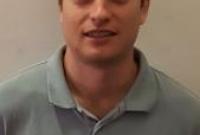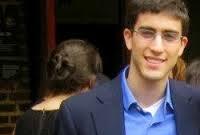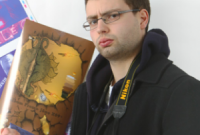Cryptography and Information Security (CIS) Seminar
 |
Silas Richelson: On the Hardness of Learning with Rounding with Small Modulus Friday, September 18, 2015 - 10:30am to 12:00pm Abstract: We show the following reductions from the learning with errors problem (LWE) to the learning with rounding problem (LWR): (1) Learning the se |
 |
Ranjit Kumaresan: Secure Computation with Minimal Interaction, Revisited Friday, September 11, 2015 - 10:30am to 12:00pm Abstract: Motivated by the goal of improving the concrete efficiency of secure multiparty computation (MPC), we revisit the question of MPC with only two rounds of interaction. |
 |
Aloni Cohen: Publicly Verifiable Software Watermarking Friday, May 15, 2015 - 10:30am to 12:00pm Abstract: Software Watermarking is the process of transforming a program into a functionally equivalent “marked” program in such a way that it is computationally hard to remove the mark without destroying functionality. |
 |
Mark Zhandry: Order-Revealing Encryption and the Hardness of Private Learning Friday, May 8, 2015 - 10:30am to 12:00pm |
 |
Justin Holmgren: Succinctly Garbling and Obfuscating RAM programs Friday, May 1, 2015 - 10:30am to 12:00pm Abstract: Program obfuscation, and in particular the notion of Indistinguishability Obfuscation (IO) has |
 |
Ben Fisch: Physical Zero Knowledge and Secure Computation Friday, March 6, 2015 - 10:30am to 12:00pm Abstract: Is it possible to prove that two DNA-fingerprints match, or that they do not match, without revealing any further information about the fingerprints? Is it possible to prove that two objects have the same design without revealing the design itself? |
 |
Ranjit Kumaresan: How to Use Bitcoin to Design Fair Protocols Friday, March 13, 2015 - 10:30am to 12:00pm Abstract:
We study a model of fairness in secure computation in which an adversarial party that
aborts on receiving output is forced to pay a mutually predefined monetary penalty. We |
 |
Silas Richelson: Topology-Hiding Computation Friday, February 13, 2015 - 10:30am to 12:00pm Abstract: |
 |
Vanishree Rao: Adaptive Multiparty Non-Interactive Key Exchange without Setup in the Standard Model Friday, January 23, 2015 - 10:30am to 12:00pm Abstract: Non-interactive key exchange (NIKE) is a fundamental notion in Cryptography. This notion was introduced by Diffie and Hellman in 1976. |
 |
Raphael Bost: Machine Learning Classification over Encrypted Data Friday, February 6, 2015 - 10:30am to 12:00pm Abstract: Machine learning classification is used in numerous settings nowadays, such as medical or genomics predictions, spam detection, face recognition, and financial predictions. |
